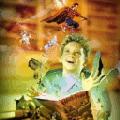258 - Pasión por la lectura
|||reading
258 - Passion for reading
258 - شوق خواندن
258 - Passion pour la lecture
258 - Passion för läsning
Pasión por la lectura
MUJER ¿Qué por qué me gusta la lectura?...
WOMAN Why do I like reading?...
Bueno... Hay algo que agradezco mucho a mis padres...
|||that|appreciate||||
Well... There is something that I am very grateful to my parents...
PADRE Hija...
FATHER Daughter...
HIJA Si papá.
DAUGHTER Yes dad.
PADRE Tráeme el periódico por favor, veamos qué nos cuentan las noticias hoy.
|Bring me|||||||||||
FATHER Bring me the newspaper please, let's see what the news has to say today.
HIJA Ya voy...
DAUGHTER I'm coming...
MUJER Siempre los vi leyendo, en periódicos, libros, revistas, y ese ejemplo los recibí de ellos sin que me dijeran nada.
|Always|||||||magazines||||||||without||to me|said|nothing
WOMAN I always saw them reading, in newspapers, books, magazines, and I received that example from them without being told anything.
Me enamoré de la lectura.
I|I fell||the|
I fell in love with reading.
LOCUTOR Cuando niños y niñas ven a sus padres leer entienden que es una actividad que disfrutan y de alguna manera se motivan más.
||||||||||||||||||||way||they motivate|
ANNOUNCER When boys and girls see their parents reading, they understand that it is an activity they enjoy and somehow they are more motivated.
PAPÁ ¿Dónde nos quedamos?
|||stay
DAD Where do we stay?
NIÑO Donde el marciano es recibido por todos en la tierra y…
|Where||martian||||||||
CHILD Where the Martian is received by everyone on earth and ...
PAPÁ Ajá, muy bien.
LOCUTORA Leer un libro durante varias noches crea el hábito por la lectura y permite que el niño o la niña sigan una secuencia en la historia.
|||||||||habit||the||||||||||||sequence|||
ANNOUNCER Reading a book for several nights creates the habit of reading and allows the child to follow a sequence in the story.
NIÑA Papi, ven, léeme el libro…
|||read||
GIRL Daddy, come, read me the book...
LOCUTOR Le permite participar, compartir y, sobre todo, esperar el momento de la lectura con muchas ganas.
||||to share||||||||||with|many|excitement
ANNOUNCER It allows you to participate, share and, above all, look forward to the reading moment.
LOCUTORA Los libros se comparten y se discuten para ser entendidos.
|||||||discussed|||understood
ANNOUNCER Books are shared and discussed to be understood.
LOCUTOR Los niños y las niñas necesitan que alguien les enseñe a usarlos.
||||||||||||to use them
The children need someone to teach them how to use them.
NIÑO Papá, ¿y qué quiere decir “poliglota”?
||||||polyglot
BOY Dad, and what does "polyglot" mean?
PAPÁ Es una persona que habla muchos idiomas… por eso, el marciano se podía comunicar con la gente de la tierra…
DAD He is a person who speaks many languages... that's why the Martian could communicate with the people of the earth...
LOCUTOR Recuerda, cada día tienes una oportunidad para que tu hijo o tu hija se enamore del maravilloso mundo de la lectura.
|||||||||||||||falls in love||||||
ANNOUNCER Remember, every day you have an opportunity for your son or daughter to fall in love with the wonderful world of reading.
LOCUTORA No la dejes pasar… ¡Comienza ya!
|||don't|||
ANNOUNCER Don't let her pass… Start now!

